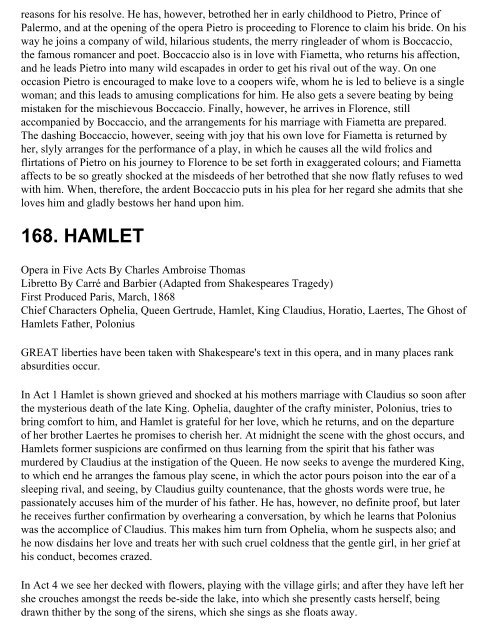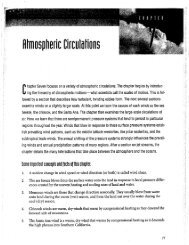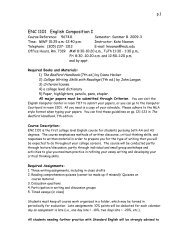Opera Plots I - MDC Faculty Home Pages
Opera Plots I - MDC Faculty Home Pages
Opera Plots I - MDC Faculty Home Pages
You also want an ePaper? Increase the reach of your titles
YUMPU automatically turns print PDFs into web optimized ePapers that Google loves.
easons for his resolve. He has, however, betrothed her in early childhood to Pietro, Prince of<br />
Palermo, and at the opening of the opera Pietro is proceeding to Florence to claim his bride. On his<br />
way he joins a company of wild, hilarious students, the merry ringleader of whom is Boccaccio,<br />
the famous romancer and poet. Boccaccio also is in love with Fiametta, who returns his affection,<br />
and he leads Pietro into many wild escapades in order to get his rival out of the way. On one<br />
occasion Pietro is encouraged to make love to a coopers wife, whom he is led to believe is a single<br />
woman; and this leads to amusing complications for him. He also gets a severe beating by being<br />
mistaken for the mischievous Boccaccio. Finally, however, he arrives in Florence, still<br />
accompanied by Boccaccio, and the arrangements for his marriage with Fiametta are prepared.<br />
The dashing Boccaccio, however, seeing with joy that his own love for Fiametta is returned by<br />
her, slyly arranges for the performance of a play, in which he causes all the wild frolics and<br />
flirtations of Pietro on his journey to Florence to be set forth in exaggerated colours; and Fiametta<br />
affects to be so greatly shocked at the misdeeds of her betrothed that she now flatly refuses to wed<br />
with him. When, therefore, the ardent Boccaccio puts in his plea for her regard she admits that she<br />
loves him and gladly bestows her hand upon him.<br />
168. HAMLET<br />
<strong>Opera</strong> in Five Acts By Charles Ambroise Thomas<br />
Libretto By Carré and Barbier (Adapted from Shakespeares Tragedy)<br />
First Produced Paris, March, 1868<br />
Chief Characters Ophelia, Queen Gertrude, Hamlet, King Claudius, Horatio, Laertes, The Ghost of<br />
Hamlets Father, Polonius<br />
GREAT liberties have been taken with Shakespeare's text in this opera, and in many places rank<br />
absurdities occur.<br />
In Act 1 Hamlet is shown grieved and shocked at his mothers marriage with Claudius so soon after<br />
the mysterious death of the late King. Ophelia, daughter of the crafty minister, Polonius, tries to<br />
bring comfort to him, and Hamlet is grateful for her love, which he returns, and on the departure<br />
of her brother Laertes he promises to cherish her. At midnight the scene with the ghost occurs, and<br />
Hamlets former suspicions are confirmed on thus learning from the spirit that his father was<br />
murdered by Claudius at the instigation of the Queen. He now seeks to avenge the murdered King,<br />
to which end he arranges the famous play scene, in which the actor pours poison into the ear of a<br />
sleeping rival, and seeing, by Claudius guilty countenance, that the ghosts words were true, he<br />
passionately accuses him of the murder of his father. He has, however, no definite proof, but later<br />
he receives further confirmation by overhearing a conversation, by which he learns that Polonius<br />
was the accomplice of Claudius. This makes him turn from Ophelia, whom he suspects also; and<br />
he now disdains her love and treats her with such cruel coldness that the gentle girl, in her grief at<br />
his conduct, becomes crazed.<br />
In Act 4 we see her decked with flowers, playing with the village girls; and after they have left her<br />
she crouches amongst the reeds be-side the lake, into which she presently casts herself, being<br />
drawn thither by the song of the sirens, which she sings as she floats away.













